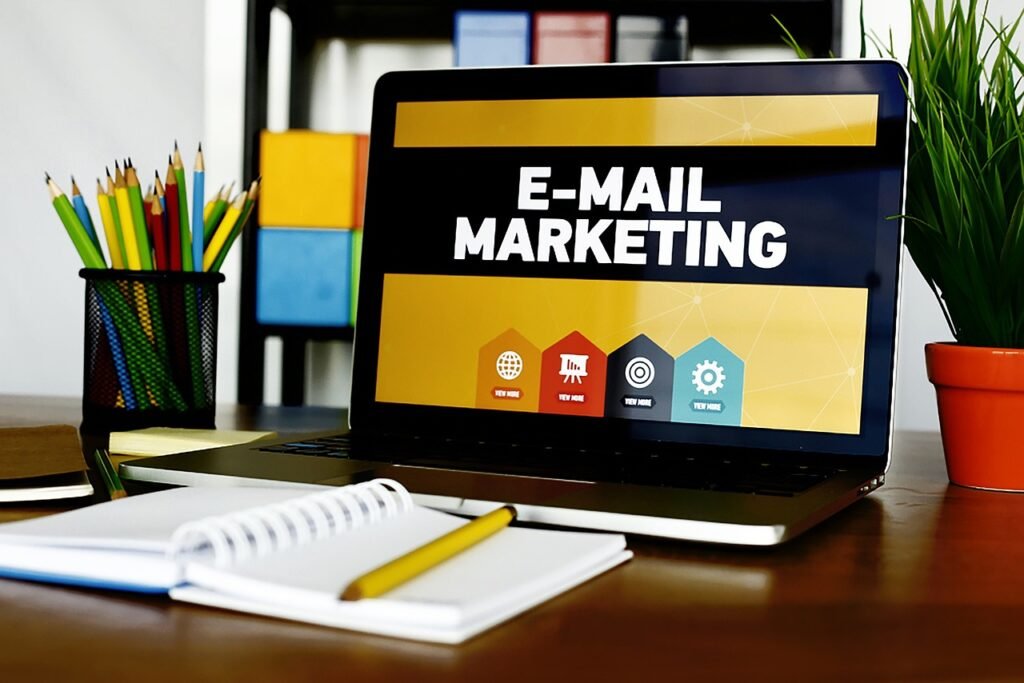
In the realm of digital marketing, email marketing remains a powerful tool for businesses to connect with their audience, nurture leads, and drive conversions. It allows businesses to deliver targeted messages directly to the inbox of potential customers, fostering personalized communication and building long-term relationships. In this article, we will explore the key elements of an effective email marketing strategy and discuss how businesses can leverage this channel to maximize engagement and achieve their marketing objectives.
Table of Contents
- Introduction: The Power of Email Marketing
- Building a Quality Email List
- Defining Email Marketing Goals and Objectives
- Crafting Compelling and Personalized Email Content
- Designing Engaging Email Templates
- Implementing Effective Email Automation
- Optimizing for Mobile Devices
- Segmenting Email Campaigns for Targeted Communication
- A/B Testing and Performance Optimization
- Monitoring and Analyzing Email Metrics
- Ensuring Compliance with Email Marketing Laws
- Growing and Maintaining Subscriber Engagement
- Email Deliverability Best Practices
- Integrating Email Marketing with Other Channels
- Conclusion
1. Introduction: The Power of Email Marketing
Email marketing is a direct and personal way to engage with potential customers. It allows businesses to reach their target audience directly in their inbox, providing an opportunity to deliver tailored content, promotions, and updates. With a well-planned strategy, businesses can nurture leads, build brand loyalty, and drive conversions through effective email communication.
2. Building a Quality Email List
A quality email list is the foundation of successful email marketing. Businesses should focus on organically growing their list by implementing opt-in forms, lead magnets, and incentives to encourage website visitors to subscribe. It is crucial to obtain explicit permission from subscribers and ensure compliance with data protection regulations.
3. Defining Email Marketing Goals and Objectives
Clear goals and objectives are essential for shaping an effective email marketing strategy. Whether it’s driving sales, increasing website traffic, promoting new products, or building customer loyalty, defining specific and measurable goals helps businesses tailor their email campaigns and track their success.
4. Crafting Compelling and Personalized Email Content
To capture the attention of recipients, emails must contain compelling and relevant content. Personalization is key, as it allows businesses to address subscribers by name and tailor the content based on their preferences and past interactions. Content should be informative, engaging, and provide value to the recipient.
5. Designing Engaging Email Templates
Well-designed email templates enhance the visual appeal of emails and improve the overall user experience. Emails should be branded, visually appealing, and optimized for readability. Attention-grabbing subject lines and clear calls-to-action (CTAs) can entice recipients to open the email and take the desired action.
6. Implementing Effective Email Automation
Email automation streamlines the email marketing process and ensures timely and relevant communication. Businesses can set up automated welcome emails, drip campaigns, abandoned cart reminders, and post-purchase follow-ups. Automation saves time, maintains consistency, and allows businesses to nurture leads throughout the customer journey.
7. Optimizing for Mobile Devices
With the increasing use of mobile devices, it is crucial to optimize emails for mobile responsiveness. Emails should be mobile-friendly, with a responsive design that adapts to different screen sizes. Mobile optimization ensures a seamless user experience and maximizes engagement on smartphones and tablets.
8. Segmenting Email Campaigns for Targeted Communication
Segmentation allows businesses to divide their email list into specific groups based on demographics, preferences, behaviors, or purchase history. By segmenting the list, businesses can send highly targeted and relevant content to each group, increasing the chances of engagement and conversion.
9. A/B Testing and Performance Optimization
A/B testing involves creating variations of email elements (subject lines, CTAs, images, etc.) to determine which performs better. Testing helps optimize email campaigns by identifying the most effective strategies. By analyzing performance metrics and making data-driven decisions, businesses can continuously improve their email marketing efforts.
10. Monitoring and Analyzing Email Metrics
Monitoring and analyzing email metrics provide valuable insights into the success of email campaigns. Metrics such as open rates, click-through rates (CTRs), conversion rates, and unsubscribe rates help businesses evaluate campaign performance, identify areas for improvement, and refine their email marketing strategy.
11. Ensuring Compliance with Email Marketing Laws
Businesses must adhere to email marketing laws and regulations to maintain trust and protect user data. Compliance includes obtaining consent, providing clear unsubscribe options, and including relevant contact information in emails. Familiarizing oneself with laws such as the CAN-SPAM Act (in the United States) or the GDPR (in the European Union) is crucial.
12. Growing and Maintaining Subscriber Engagement
Subscriber engagement is vital for the success of email marketing. Businesses can foster engagement by providing valuable content, exclusive offers, and interactive elements. Encouraging recipients to respond, share, or provide feedback helps maintain an active and engaged subscriber base.
13. Email Deliverability Best Practices
To ensure emails reach the intended recipients’ inbox, businesses must follow email deliverability best practices. These include using reputable email service providers, authenticating domains, maintaining a good sender reputation, avoiding spam triggers, and regularly monitoring deliverability metrics.
14. Integrating Email Marketing with Other Channels
Email marketing should be integrated with other marketing channels to create a cohesive and effective marketing strategy. Businesses can leverage social media, content marketing, and advertising to support and complement their email campaigns. Consistency in messaging and cross-channel promotion enhances brand visibility and engagement.
15. Conclusion
Email marketing remains a powerful and cost-effective tool for businesses to connect with their audience, nurture leads, and drive conversions. By implementing the key elements outlined in this article, businesses can develop an effective email marketing strategy that maximizes engagement, builds brand loyalty, and achieves their marketing objectives.
FAQs (Frequently Asked Questions)
1. How often should businesses send marketing emails?
The frequency of sending marketing emails depends on the nature of the business and the preferences of the target audience. It is important to find the right balance between staying top-of-mind and avoiding overwhelming subscribers. Testing different frequencies and monitoring engagement metrics can help determine the optimal email sending frequency.
2. How can businesses increase email open rates?
To increase email open rates, businesses can focus on crafting compelling subject lines that grab attention and spark curiosity. Personalization, relevance, and urgency can also enhance open rates. Testing different subject lines and analyzing open rate data can help optimize email content for higher engagement.
3. How can businesses reduce unsubscribe rates?
Reducing unsubscribe rates involves delivering valuable content that aligns with the subscribers’ expectations and interests. Maintaining consistency in email frequency, allowing subscribers to customize their preferences, and offering exclusive benefits can also help retain subscribers. Regularly reviewing and optimizing email content based on subscriber feedback can contribute to reducing unsubscribe rates.
Articles
-
 The Old Money Trend: Timeless Elegance Reimagined
The Old Money Trend: Timeless Elegance Reimagined -
 Brand Manager - The Importance of the Role and Why So Many Companies Are Not Getting It Right
Brand Manager - The Importance of the Role and Why So Many Companies Are Not Getting It Right -
 Branding: Building a Lasting Impression
Branding: Building a Lasting Impression -
 Brand Equity: Building Long-Term Value
Brand Equity: Building Long-Term Value -
 Brand Management: Nurturing and Sustaining Brand Success
Brand Management: Nurturing and Sustaining Brand Success -
 Digital Marketing Strategy: Driving Success in the Digital Age
Digital Marketing Strategy: Driving Success in the Digital Age -
 Email Marketing: Driving Engagement and Conversions
Email Marketing: Driving Engagement and Conversions -
 SEO in Digital Marketing: Unlocking Organic Growth and Visibility
SEO in Digital Marketing: Unlocking Organic Growth and Visibility -
 Personal Branding: Unleashing the Power Within
Personal Branding: Unleashing the Power Within -
 Brand Strategy: Building a Strong Foundation for Success
Brand Strategy: Building a Strong Foundation for Success -
 Brand Positioning: Creating a Strong Market Presence
Brand Positioning: Creating a Strong Market Presence
Services Offered:
1. Comprehensive Brand Strategy
2. SEO, SEM & Content Strategy
3. Email Marketing
Meet Him:
I am the founder of a digital artisanal brand called The Connoisseur. Our brand aims to seamlessly connect individuals through technology and design, facilitating the exchange of exquisite art and art-inspired objects. Through our platform, we not only support the creative community but also educate our audience through engaging editorial content on topics spanning decor, fashion, art, and lifestyle.
With a master’s degree in Engineering with Management from King’s College London, and extensive experience in the startup ecosystem locally and globally, I bring a wealth of knowledge to the table. Whether you require guidance in brand strategy, Ecommerce, Luxury, Digital Marketing, or User Experience design (UX), I am here to offer valuable insights. Don’t hesitate to schedule a consultation today and let’s discuss how I can assist you.

Entrepreneur & Brand Consultant
If you found the article informative then please do share it with your network
Contact form
SM
Navigation
Get in touch
New Delhi
Email: contact@sabyasachi.world












